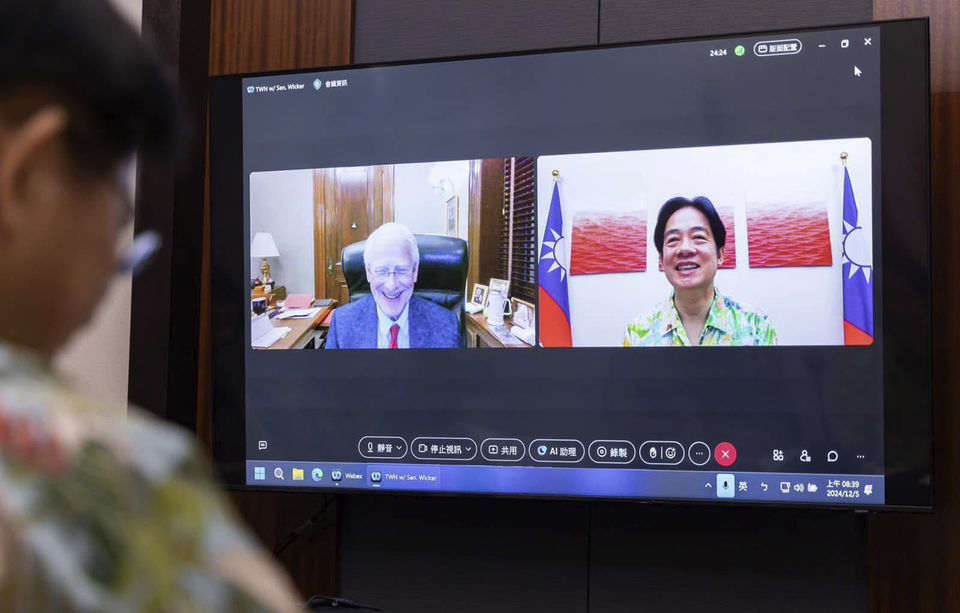Taiwanese President Lai Ching-te has called on China to “open its arms rather than raise its fists” as he ended his first overseas tour since taking office in May.
His remarks at a news conference Friday in Palau, a Pacific Island nation, came after widespread speculation that China will hold military drills around Taiwan in response to his trip.
“No matter how many military exercises and warships and aircraft are used to coerce neighbouring countries, they will not be able to win the respect of any country,” he said.
The president spoke a day after China’s foreign ministry announced sanctions on Thursday on 13 American companies and six executives in response to recently announced US weapons sales to Taiwan.
Taiwan and China split in 1949 during a civil war that saw the victorious communists take control in Beijing and the nationalists setting up a rival government in Taiwan, an island of 23 million people off China’s east coast.
China’s long-ruling Communist Party says Taiwan is part of China and must come under its control at some point.
Mr Lai’s trip to the Pacific, which included US stops in Hawaii and Guam, took him into the heart of a maritime region where China is jockeying with the United States and its allies for influence and control.
He also visited the Marshall Islands, Tuvalu and Palau, three of the 12 countries that have diplomatic ties with Taiwan. The rest of the world, including the US, has official ties with China.
The Taiwanese leader, who spoke by phone to US congressional leaders while in Guam, dismissed concern that US President-elect Donald Trump may be less committed to Taiwan’s cause than current President Joe Biden has been.
“Taiwan is confident that it will continue to deepen co-operation with the new government, resist authoritarian expansion, create prosperity and development for both countries, and contribute more to regional stability and peace,” he said.
Taiwan’s President Lai Ching-te is seen on screen during a video call with US Senator Roger Wicker, the top Republican on the Senate Armed Services Committee (Taiwan Presidential Office via AP)
Mr Lai’s two stops in US territory angered China, which opposes US arms sales and military assistance to Taiwan. Washington is the main supplier of weapons for Taiwan’s defence.
Chinese foreign ministry spokesman Lin Jian, speaking at a daily briefing in Beijing, accused Taiwan and the US of engaging in official exchanges in Hawaii and Guam and said the US action provided a platform for Taiwan independence and separatist activities.
“Lai Ching-te and the DPP authorities have been engaging in Taiwan independence activities under various guises,” Mr Lin said, referring to Mr Lai’s Democratic Progressive Party.
“But no matter what they say or do, they will never change the fact that Taiwan is part of China, nor will they stop the overwhelming trend that China will and must be reunited. To seek independence by soliciting foreign support is doomed to failure.”
Mr Lai played up the distinction between authoritarian governments and democracies such as Taiwan and the US, noting Russia’s military co-operation with both China and North Korea, including the dispatch of North Korean troops to Russia for the war against Ukraine.
“As I have often said before, when authoritarian countries gather together, democratic countries must unite to ensure global and regional stability and development,” he said.
Mr Lai also said that China must stop using threats and inducements to try to persuade other countries to switch diplomatic allegiance from Taiwan to China, after Paraguay kicked out a visiting Chinese diplomat this week.
The envoy had missed a session at a UN meeting and instead went to Paraguay’s Congress building to urge politicians to break off relations with Taiwan.
Taiwan’s small number of diplomatic allies has dwindled further in recent years as Beijing has successfully wooed several to establish ties with China.
